Kim Quek | May 14, 09 5:31pm
An intriguing question arises as Court of Appeal judge Ramli Ali ordered (on May 12) a stay of execution on high court's declaratory judgment that Nizar Jamaluddin - not Zambry Abdul Kadir - is the lawful menteri besar of Perak.
In his judgment the day before (May 11), High Court Judge Aziz Rahim declares that Nizar had never ceased to be the menteri besar while Zambry Kadir had never been one.
So what does Ramli mean when he orders a stay of execution? Does he not mean to ask Nizar to cease to be menteri besar from now onwards until the case is finally settled at the higher courts? But that would mean stripping Nizar of a status that he has always enjoyed. Would that be fair to Nizar when the high court judgment has not been overturned by a higher court?
The litigation ahead is a long and tortuous road and may take years to reach its final conclusion at the highest court. Is it not a gross injustice to Nizar that he - a declared lawful menteri besar - has to stand aside so that Zambry - a declared pretender - can occupy the menteri besar's seat?
It is recognised that while the legal tussle is still ongoing, we need some one to act as menteri besar. Who is more qualified to act in that position - Nizar or Zambry? That depends on who enjoys a higher legal and moral standing for that purpose. After the Aziz judgment, it has to be Nizar.
This is the reason why Aziz had rejected Zambry's request for a stay of execution immediately after he delivered the judgment - to avoid aborting justice at this stage.
And what is the ground put up by Zambry for wanting the stay order? According to his lawyer Cecil Abraham, it is to stop Nizar from approaching the sultan for a dissolution of the state assembly for state-wide elections. His rationale is that, once an election is held, Zambry's appeal is rendered academic.
Now, let us examine this rationale. Assuming there is no order to stay execution, and as a result, Nizar succeeds in dissolving the assembly and an election is held, how would that do injustice to Zambry? Is Zambry saying that in an election, his party would be unfairly treated by our electoral system?
But that would be a ridiculous suggestion as our Election Commission has been overtly pro- Barisan Nasional and all the government institutions and the public media have always been heavily abused to favour BN in every election. Or is Zambry saying that he has a much stronger case in court?
But that would be a farfetched exertion as it is the considered legal opinion that the balance tips in Nizar's favour in fact and in law. This opinion is supported by Aziz's detailed and meticulous judgment that took him more than one hour to read out.
In fact, a fresh election for Perak is not only a fair solution where none would suffer injustice, but the only practical way out of the present state of near anarchy in the state, with both parties fighting tooth and nail (physically at times) to claim authority to rule, while a host of suits and counter-suits are pending in the higher courts, all which arose from the illegal power grab engineered by Prime Minister Najib Abdul Razak in early February.
That BN has been doggedly determined to avoid an election despite such compelling circumstances only reveals that it is a party working for only its self-interests. Its policy is anti- rakyat in that it is not only depriving the people of their right to choose their own government, but dooming them to suffer political and economic turmoil in the years ahead.
And the rash action by Ramli to grant Zambry the stay order in circumstances that draws consternation only worsens the image of the judiciary while further eroding confidence in the government.
Apart from wanting in rationale, the lightning speed with which Ramly had granted the order must have caught many people by surprise - receiving the application at 0930 hours, convening the hearing at 1130 hours and passing the judgment at 1300 hours, thus reversing Aziz's rejection of a stay order in only 21 hours.
What a superb performance by our courts known for their snail's pace (I recall that following Anwar Ibrahim's sodomy conviction in 2000, it took the court of appeal three years before it began hearing Anwar's appeal). But is it not a bit too hasty to reach a decision on an issue so important that it could have changed the course of history?
And on such an important issue, why did Ramli sit alone, bereft of the usual panel of judges of at least three in a court of appeal hearing? Such breaking of its own rules can only be justified in an emergency situation where the slightest delay in granting an order may result in irreparable injury to a party.
Has such a situation developed for Zambry? What injury could Zambry suffer if it takes several days instead of several hours for the court to reach a decision? Or did Ramly feel the same sense of urgency as expressed by lawyer Abraham that any delay in granting the order may precipitate a catastrophe for BN in the form of a state-wide election for Perak? But should the judiciary's conduct be dictated by such political maneuvering?
Subscribe to:
Post Comments (Atom)










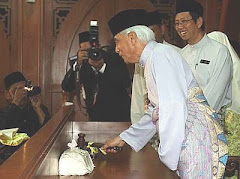
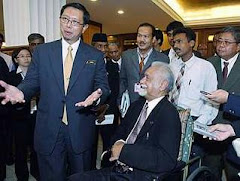






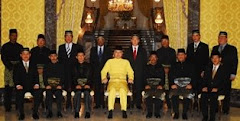


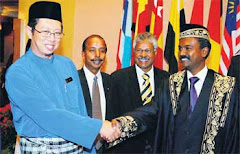
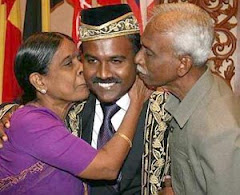
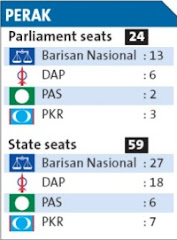

No comments:
Post a Comment